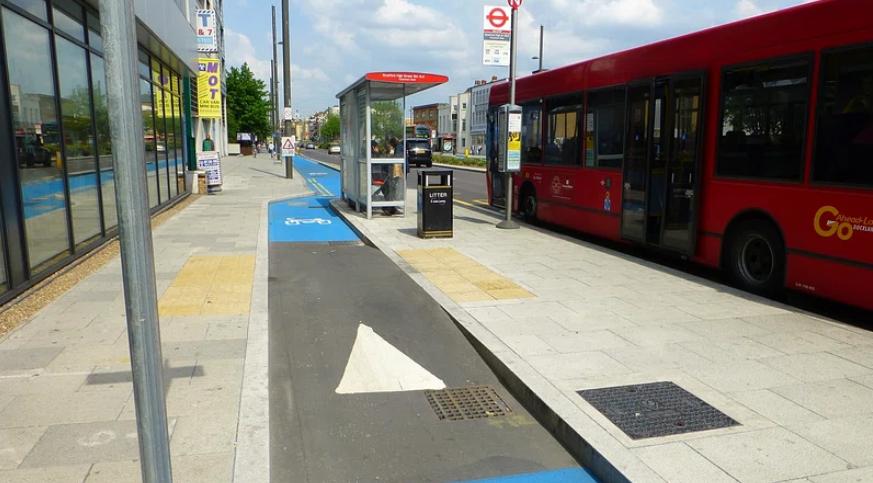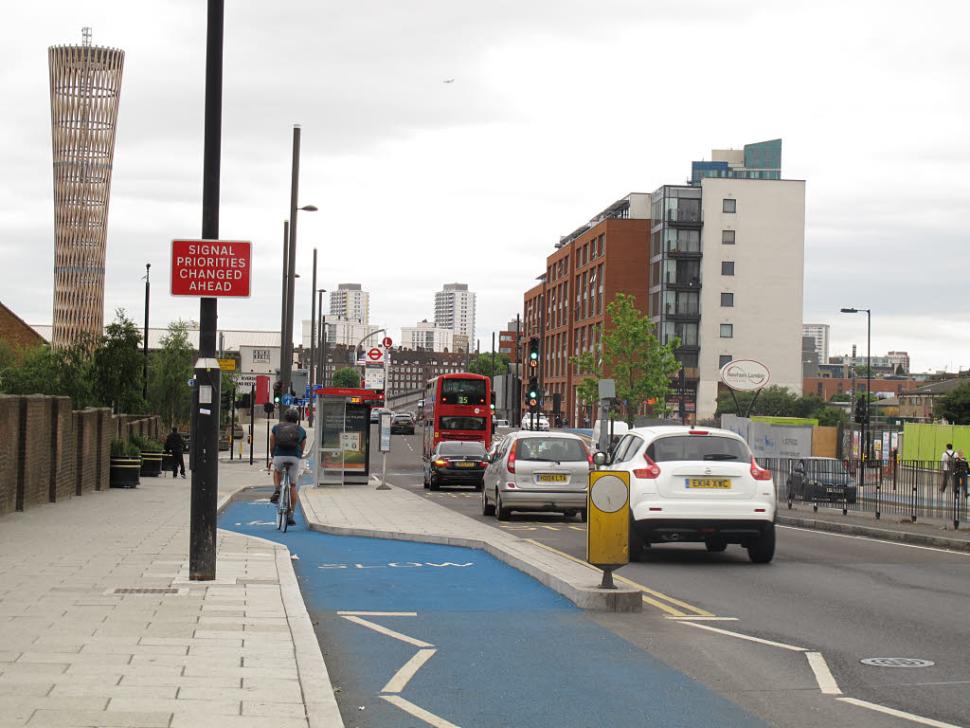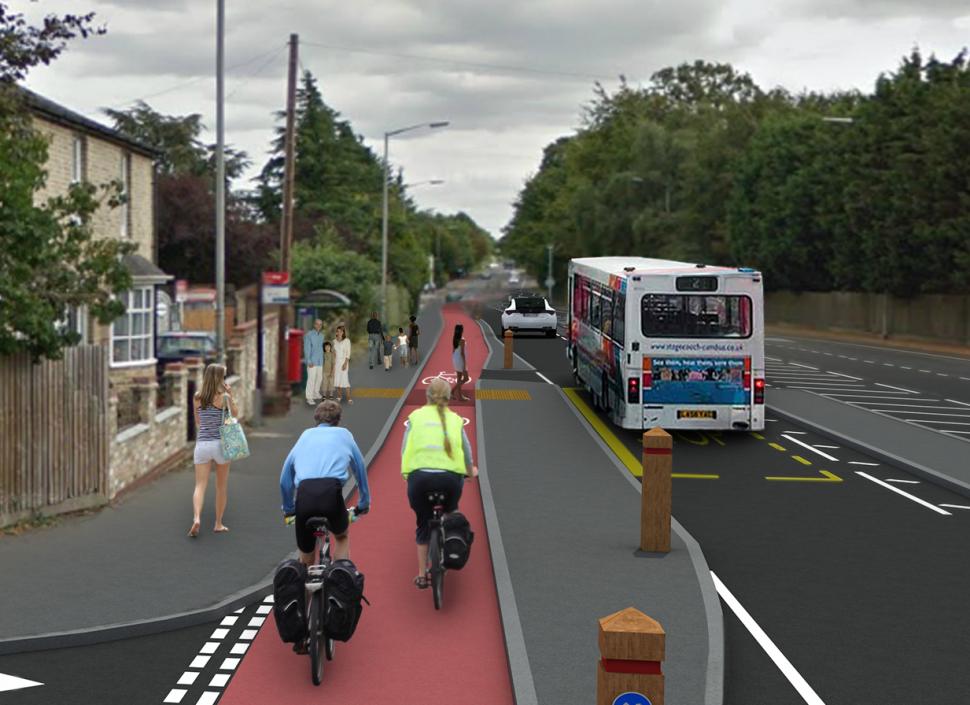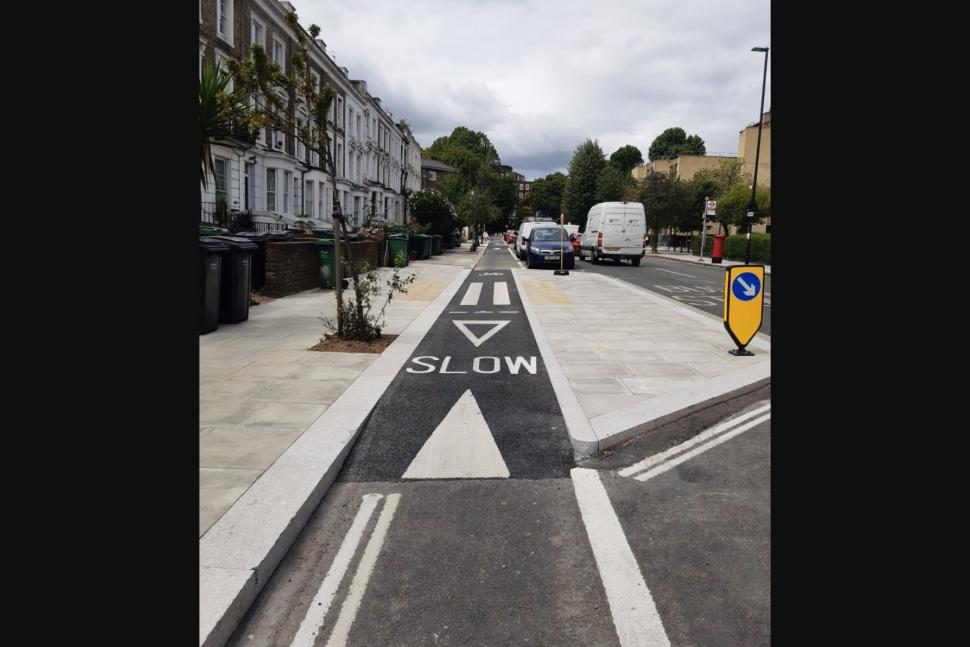- News
- Reviews
- Bikes
- Accessories
- Accessories - misc
- Computer mounts
- Bags
- Bar ends
- Bike bags & cases
- Bottle cages
- Bottles
- Cameras
- Car racks
- Child seats
- Computers
- Glasses
- GPS units
- Helmets
- Lights - front
- Lights - rear
- Lights - sets
- Locks
- Mirrors
- Mudguards
- Racks
- Pumps & CO2 inflators
- Puncture kits
- Reflectives
- Smart watches
- Stands and racks
- Trailers
- Clothing
- Components
- Bar tape & grips
- Bottom brackets
- Brake & gear cables
- Brake & STI levers
- Brake pads & spares
- Brakes
- Cassettes & freewheels
- Chains
- Chainsets & chainrings
- Derailleurs - front
- Derailleurs - rear
- Forks
- Gear levers & shifters
- Groupsets
- Handlebars & extensions
- Headsets
- Hubs
- Inner tubes
- Pedals
- Quick releases & skewers
- Saddles
- Seatposts
- Stems
- Wheels
- Tyres
- Health, fitness and nutrition
- Tools and workshop
- Miscellaneous
- Tubeless valves
- Buyers Guides
- Features
- Forum
- Recommends
- Podcast
news
 Floating bus stop (CC0 1.0 DEED/RawPixel public domain)
Floating bus stop (CC0 1.0 DEED/RawPixel public domain)Warning government considering ban on floating bus stops "could stop new protected cycle lanes"
A cycling campaign group and London's walking and cycling commissioner have warned that a potential ban on the floating bus stop design of cycle lane could "stop new protected cycle lanes", would mean "fewer people cycling" and "lives at risk across the country".
The reaction comes after the Guardian this afternoon broke the news that the Transport Secretary Mark Harper is considering a ban on the cycle lane design which sees passengers walk cross cycling infrastructure to access bus stops.
Despite having attracted criticism from many, notably from blindness campaigners and charities who say the design puts blind people in danger and can be intimidating, they have been used widely across Europe and some UK cities due to challenge of building effective protected cycle lanes on bus routes when road space is limited.
> "Like playing Russian roulette": Blind people raise concerns about 'floating' cycle lane bus stops
In January, leaked documents suggested that there was a "low risk" of cyclist collisions at floating bus stops, slides from a presentation made by London's Walking and Cycling Commissioner Will Norman showing that of 623 reported instances of pedestrians being injured in a collision with a cyclist in London between 2020 and 2022, just four occurred at a floating bus stop (0.6 per cent — two people were seriously injured and another two suffered minor injuries).
It is to that context that Norman has this afternoon reacted to the news that the Transport Secretary is considering banning the design by warning that it could "stop new protected cycle lanes, putting lives at risk across the country", whereas the risk of a cyclist hitting a pedestrian at one is "very low".
The London Cycling Campaign also reacted, saying the "evidence" does not suggest that they "represent a major barrier to mobility, a major danger, nor a new emerging issue".
"Yes, some cyclists fail to stop, yes, better design guidance needed, but removing them would mean likely fewer people cycling, particularly women, kids, elderly and disabled people," a thread on social media began. "Meanwhile, there are other issues government is dodging — it's sat on pavement parking action for years, a huge issue for the visually impaired, disabled people, parents etc. (and don't get us started on how many signalised junctions lack pedestrian crossing signals, or are staggered crossings, or force you to wait for minutes at a time!)
"This, then is the government... promoting a 'Plan for Drivers', which is increasingly leaving any planning for cycling, walking, wheeling, the climate and road danger by the roadside, stranded."
The Guardian's Peter Walker explained how it is believed Harper has taken the concerns of groups such as the National Federation of the Blind UK (NFBUK) seriously because he formerly served as the minister for disabled people.
Duncan Dollimore, Cycling UK's head of campaigns, commented on the news: "Bus stop bypasses are needed to separate cyclists from motor traffic on some roads which include bus routes and cycle routes, to create continuous cycle tracks which enable more people to cycle safely, enabling them to live healthier, happier, and greener lives.
"But we must ensure this is done in cooperation with people with disabilities, whose needs must be fully considered in the design process."
A Department for Transport spokesperson added: "While TfL are responsible for these schemes in London, we expect local authorities to engage with disability groups and follow our guidance which clearly sets out that all infrastructure designs should be accessible for everyone."
Yesterday, Transport Secretary Harper said tougher legislation to prosecute cyclists who kill or injure pedestrians is "under review" and will be considered "with an open mind", the comments coming after Sir Iain Duncan Smith, the former leader of the Conservative Party, has this week tabled a series of amendments to the Criminal Justice Bill that would see cyclists, as well as riders of electric scooters and "personal transporters", subject to stricter laws if they ride dangerously and kill or injure.
Dan is the road.cc news editor and joined in 2020 having previously written about nearly every other sport under the sun for the Express, and the weird and wonderful world of non-league football for The Non-League Paper. Dan has been at road.cc for four years and mainly writes news and tech articles as well as the occasional feature. He has hopefully kept you entertained on the live blog too.
Never fast enough to take things on the bike too seriously, when he's not working you'll find him exploring the south of England by two wheels at a leisurely weekend pace, or enjoying his favourite Scottish roads when visiting family. Sometimes he'll even load up the bags and ride up the whole way, he's a bit strange like that.
Latest Comments
- Simon E 4 sec ago
It used to be called Buy Nothing Day as a protest against the the Black Friday discounting madness. The constant BF adverts, promos and stuff...
- Rendel Harris 45 min 36 sec ago
I believe that if you apply strict mathematical rules you have a subtraction, e.g. if you say three times less than five mathematically that's 5 - ...
- FionaJJ 1 hour 50 min ago
Just yesterday I saw a driver (in 4x4) take a slightly sharper corner at speed, very tight to the kerb. In this place there's a high wall parallel...
- chrisonabike 2 hours 15 min ago
Apologies - you're quite right! Something about presentation and comprehension...
- wtjs 2 hours 36 min ago
You can find out whether they're lying about 'taking action' by asking them what they actually did. When they refuse to tell you, citing various...
- chrisonabike 7 hours 20 min ago
Also don't forget - Sustrans are a charity *....
- chrisonabike 7 hours 32 min ago
Yes ... but (just due to the large numbers of people affected) this likely would only proceed in the UK at a very ... cautious ... pace....
- EK Spinner 7 hours 49 min ago
Arsehole in the van not with standing, how did they manage to get a risk assessment allowing a race (a group not a TT) group to be competing on ...
- RafaDy 7 hours 45 min ago
I think reviewer completely missed the point here trying to match bike's name with what it can do. Ribble is namin git's bike weirdly, the...



Add new comment
34 comments
That is an excellent post.
One thing I would add is Wheels for Wellbeing's Floating Bus Stops discussions sheet, which encourages thought about the interests of *all* disabled people, and also standard pedestrians.
https://wheelsforwellbeing.org.uk/thinking-about-bus-stop-bypasses/
Their general view is that footways are for pedestrians not cycles, with cycles useable as mobility aids at basically walking pace by disabled people. Alongside that that cycles should not be forced into traffic (me: i.e., support for separated infra including a mobility network).
I am not aware that they have a fully developed policy position, partly because they prefer to work by conversation leading towards concensus, and perhaps also because there is a genuine balance of interested that needs to be developed and struck.
Thanks, yes missed that!
In the UK we largely seem to gloss over that "cycle paths" could also be of benefit to e.g. not just those with adapted cycles but wheelchair and mobility vehicle users. Maybe due to our binary of "space for vehicles" vs. "everything else (but essentially pedestrians)"? Maybe "they're now trying to make us fight for our scraps"?
I've also heard the idea that the "C"-word (cycle) is a trigger for some?
Here we go again.
In 2014 London Guide Dogs For The Blind made up a load of bollocks about how one in four guide dog owners said their dogs had been hit by cyclists.
I dismantled their hopeless survey methods here.
Nothing in this latest flapdoodle makes me change my conclusion:
"Guide Dogs chose to target another group of vulnerable road users instead of taking on the source of risk to all: bad drivers and London's abysmal road system.
"Road traffic danger limits everyone's mobility, and its main source is motor vehicles. But Guide Dogs doesn't have the gonads to say that London's awful roads keep partially sighted people from getting out and about, because like everyone in their position they think of traffic as being like weather: it just happens and nothing can be done about it.
"Far easier then, to go after cyclists, knowing that the mass media won't question that "irresponsible cyclists" are "smashing into blind Londoners" than to demand London's roads be organised for the convenience of people rather than motor vehicles.
"Lazy, lazy campaigning, with the wrong target."
That looks by date to be linked to the campaigns around the floating bus stops at Guys and St Thomas Hospital between the hospital and Kate Hoey MP, where the hospital gave money to campaign against then were shown to have no evidence to justify it.
The whole thing was astroturf.
As covered here by Laura Laker:
https://road.cc/content/news/197621-hospital-admits-it-didnt-research-bi...
And by blogger James Avery:
https://web.archive.org/web/20160723035206/http://www.pedalparity.com/bu...
Pages